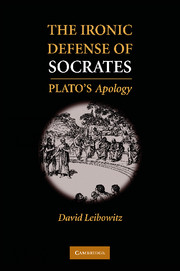Book contents
- Frontmatter
- Contents
- Acknowledgments
- Introduction
- 1 Title and Preliminary Considerations
- 2 Prooemium (17a1–18a6)
- 3 Prothesis (18a7–19a7)
- 4 Defense against the Charges of the First Accusers (19a8–24b2)
- 5 Defense against the Present Accusers (24b3–28b2)
- 6 Second Digression (28b3–34b5)
- 7 Epilogue (34b6–35d8)
- 8 Penalty Section (35e1–38b9)
- 9 Final Speech (38c1–42a5)
- 10 Conclusion
- Short Titles
- Bibliography
- Index
7 - Epilogue (34b6–35d8)
Published online by Cambridge University Press: 05 August 2011
- Frontmatter
- Contents
- Acknowledgments
- Introduction
- 1 Title and Preliminary Considerations
- 2 Prooemium (17a1–18a6)
- 3 Prothesis (18a7–19a7)
- 4 Defense against the Charges of the First Accusers (19a8–24b2)
- 5 Defense against the Present Accusers (24b3–28b2)
- 6 Second Digression (28b3–34b5)
- 7 Epilogue (34b6–35d8)
- 8 Penalty Section (35e1–38b9)
- 9 Final Speech (38c1–42a5)
- 10 Conclusion
- Short Titles
- Bibliography
- Index
Summary
Socrates' Rhetorical Strategy
In the epilogue, Socrates emphasizes his concern for reputation, which he separates from his concern for justice and piety (cf. 34d8–35b8 with 35b9–c1, 35c6–7, and 35c8–d1). Earlier, when he discussed his divine mission, he seemed to dismiss reputation as a matter of little or no importance (22a3–6, 29d7–30a2). But whatever weight he had given to his own and the city's reputations before this day, they are in the forefront of his mind at the trial. He lectures the jurors, saying in effect: “You would like to see me beg and weep. Perhaps when you were on trial for some minor offense, you yourself begged and wept. In fact, the most admired men in the city do shameful things when tried for their lives (35a4–7). But not I! I am too noble to gratify you by crawling” (cf. 34d8–e3 with 37a2–4). He explains that when those like him, who are reputed to be distinguished in wisdom, courage, or some other virtue – moderation is never mentioned in the Apology – beg, they shame not only themselves but the city, inviting foreigners to conclude that Athenians distinguished in virtue are in fact no different from women (35a7–b3). But if “Socrates the wise” were to beg, would it really reflect badly on Athens in this way (27a2)? More likely it would be said that philosophers are no different from women, and this would reduce the attractiveness of the philosophic life and make it harder to defend (cf. 28b3–5).
- Type
- Chapter
- Information
- The Ironic Defense of SocratesPlato's Apology, pp. 154 - 160Publisher: Cambridge University PressPrint publication year: 2010



